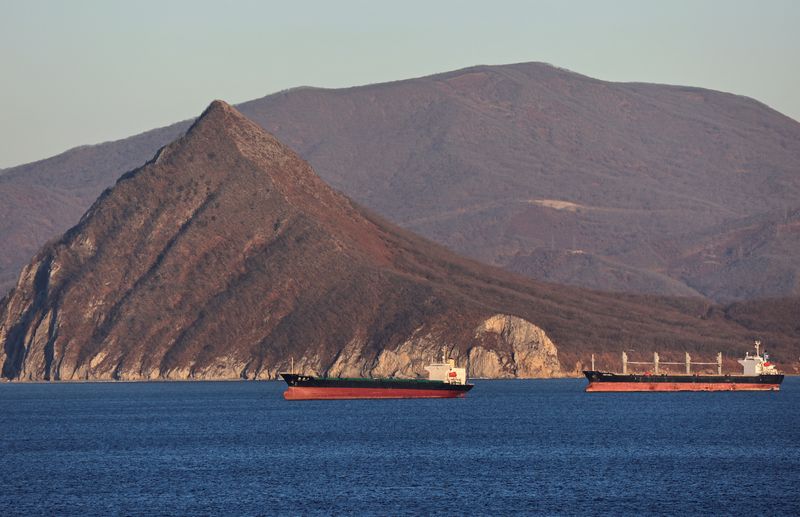By Timothy Gardner and Laura Sanicola
WASHINGTON (Reuters) -The Biden administration is poised to increase outreach to western trading houses, insurers and tanker owners to remind them to abide by the Group of Seven's price cap on Russian oil as the crude trades over that level, sources and experts said.
The approach reflects a desire by Washington to encourage buyers to adhere to the $60 per barrel cap imposed last December on sea-borne exports of Russian crude by the G7, the European Union and Australia in retaliation for Russia’s war on Ukraine.
The administration is expected to use "soft" tactics, instead of widespread threats of harsh enforcement on potential violators as that could upend energy markets, they said.
"The initial inclination on the part of Treasury is to be soft on it, not to come down like a hammer on tankers and tanker owners, to enforce, but enforce quietly with letters, phone calls," said a source familiar with the administration's thinking on the matter.
U.S. officials will likely increase communications with trading houses, tanker owners, insurers and others, reminding them that if western maritime services are used, attestations must be kept showing Russian oil was bought under $60, the source said.
A Biden administration source said such conversations with service providers about their requirements have been constant during the implementation of the caps.
"We’ve been having these types of conversations already and they will continue," the source said.
The price cap bans Western companies from providing services such as transportation, insurance and financing for the oil sold above the cap.
According to Reuters data, Russian Urals crude has been trading at or above the cap for nearly two weeks. Treasury uses a monthly average of prices to calculate the Urals price, which means it may be a while before the Russian oil price can be considered over the cap.
The Treasury's Office of Foreign Assets Control (OFAC) says individuals or companies who evade, avoid, or violate the cap could face civil or criminal enforcement actions, including fines, and that it will work with other countries to share information about evasion.
"We are hell bent on ensuring that evasions are not distorting the market," a senior U.S. Treasury official said.
'POLICY PICKLE'
The administration, however, is set to move slowly, wary of creating ripples in a market that could send rising global oil prices higher.
The administration is in a "policy pickle" because it does not want to come down too hard with enforcement threats and risk boosting global petroleum prices by interfering with the movement of oil, the source with knowledge of administration thinking said.
"They'll spook the service providers facilitating exports, they certainly don't want to do that."
High consumer energy prices are a political risk for President Joe Biden, who is seeking reelection in 2024.
The cap has always had two objectives: reducing Russia's revenues from oil exports, and ensuring that oil continues to flow to global markets. The administration insists the cap is effective.
Deputy Treasury Secretary Wally Adeyemo has recently spoken with countries with large shipping fleets and shipping trade, while Elizabeth Rosenberg, Treasury's assistant secretary for terrorist financing and financial crimes, has called protection and indemnity insurance providers, known as P&I clubs, to remind players of requirements related to Russian oil purchases, the administration source said.
COSTS TO RUSSIA
Another U.S. government source said that the Urals price is high because of recent deals to countries that are outside the cap.
Such sales, mainly to India and China, are expensive for Russia, the source said. Russia has to spend money on a ghost tanker fleet and other expenses to ship oil long distances instead of via pipelines mainly to Europe.
Adeyemo said last month the Russian central bank has guaranteed about $9 billion in a reinsurance scheme intended to replace western reinsurance, due to the price cap, money the Kremlin cannot invest in weapons to fight its war in Ukraine.
The State Department is "closely monitoring all vessels engaged in loading of crude oil and petroleum products from Russia, as well as potential evasion or non-compliance, including the use of deceptive practices to access coalition services for oil traded above the caps," a spokesperson said.
If Urals prices continue to climb above the cap, Washington could urge fellow G7 countries and the EU to raise the cap, but that would be a diplomatic and political undertaking that faces resistance from Eastern European countries and U.S. lawmakers.

Ben Cahill, an energy security and climate expert at the Center for Strategic and International Studies, agreed enforcement will proceed slowly.
"We could see stronger enforcement on the tanker fleet and the tracking of the ownership of vessels, better quality of attestation of paperwork," said Cahill. "But there won't likely be a dramatic change unless oil prices stay high for a while."